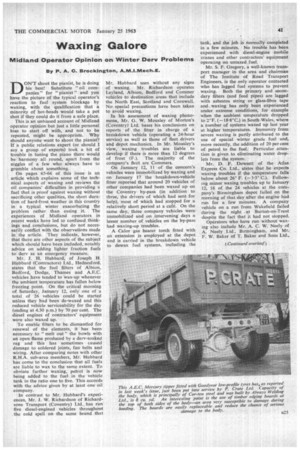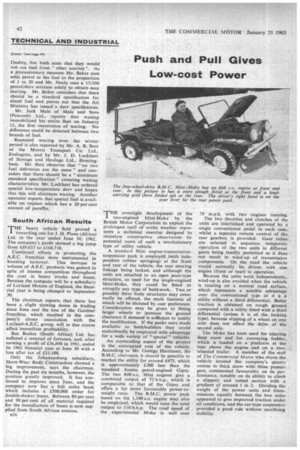Waxing Galore
Page 43

Page 44

If you've noticed an error in this article please click here to report it so we can fix it.
Midland Operator Opinion on Winter Dery Problems
By P. A. C. Brockington, A.M.I.Nlech.E.
DON'T shoot the pianist, he is doing his best! Substitute "oil companies" for " pianist " and you have the picture of the typical operator's reaction to fuel system blockage by waxing, with the qualification that a minority of hot-heads would take a pot shot if they could do it from a safe place.
This is an unbiased account of Midland operator opinion but just a little personal bias to start off with, and not to be repeated, might be appropriate. Why should anyone want to shoot the pianist? If a public relations expert (or should I say a group of experts) took a bit of trouble in tuning the piano there would be harmony all round, apart from the niggles of a few who always have to grumble about something.
On pages 65-66 of this issue is an article which explains some of the technical aspects of waxing and reviews the oil companies' difficulties in providing a fuel that is proof against waxing without sacrificing other qualities, the short duration of hard-frost weather in this country in a typical winter exacerbating the problem rather than easing it. The experiences of Midland operators in recent weeks have led to confused thinkings and conclusions, but do not necessarily conflict with the observations made in the article. They indicate, however, that there are other aspects of the subject which should have been included, notably advice on adding lighter fraction fuels to dery as an emergency measure.
Mr. J. H. Hubbard, of Joseph H. Hubbard (Contractors) Ltd., Hednesford, states that the fuel filters of Albion, Bedford, Dodge, Thames and A.E.C. vehicles have tended to Wax-up whenever the ambient temperature has fallen below freezing point. On the critical morning of Saturday, January 12, only one of a total of 26 vehicles could be started unless they had been de-waxed and this reduced vehicle serviceability for the day (ending at 4.30 p.m.) by 70 per cent. The diesel engines of contractors' equipment were also waxed up.
To enable filters to be dismantled for renewal of the elements,it has been necessary to "melt out" the bowls with an open flame produced by a derv-soaked rag and this has sometimes caused damage to soldered joints, fan belts and wiring. After comparing notes with other R.H.A. sub-area members, Mr. Hubbard has come to the conclusion that all fuels are liable to wax to the same extent. To obviate further waxing, petrol is now being added to the fuel in the vehicle tank in the ratio one to five. This accords with the advice given by at least one oil company.
In contrast to Mr. Hubbard's experiences, Mr. .J. W. Richardson of Richardsons Transport (Coventry) Ltd.. has run five diesel-engined vehicles throughout the cold spell on the same brand that Mr. Hubbard uses without any signs of waxing. Mr. Richardson operates Leyland, Albion, Bedford and Commer vehicles to destination areas that include the North East, Scotland and Cornwall. No special precautions have been taken to avoid waxing.
In his assessment of waxing phenomena, Mr. G. W. Mousley of Morton's (Coventry) Ltd. bases his conclusions on reports of the fitter in charge of a breakdown vehicle (operating a 24-hour service) as well as those of fleet drivers and depot mechanics. In Mr. Mousley's view, waxing troubles are liable to develop if there is more than 12 degrees of frost (F.). The majority of the company's fleet are Commers.
On January 12, 11 of the concern's vehicles were immobilized by waxing and on January 17 the breakdown-vehicle fitter reported that around 20 vehicles of other companies had been waxed up on the Coventry by-pass (in addition to three, the drivers of which had sent for help), most of which had stopped for a relatively short period at a café. On the same day, three company vehicles were immobilized and on intervening days a lesser number of vehicles on the by-pass had waxing-up troubles.
A Calor gas heater torch fitted with an extension is employed at the depot and is carried in the breakdown vehicle to dewax fuel systems, including the tank, and the job is normally completed in a few minutes. No trouble has been experienced with diesel-engine mobile cranes and other contractors' equipment operating on untaxed .fuel.
Mr. S. F. Gregory, a well-known transport manager in the area and chairman of The Institute of Road Transport Engineers, is the only operator contacted who has fagged fuel systems to prevent waxing. Both the primary and secondary filters (and feed pipes) are lagged with asbestos string or glass-fibre tape and., waxing has only been experienced under extreme conditions, for example when the ambient temperature dropped to 2°F, (-18-8°C.) in South Wales, where a number of systems waxed up last year at higher temperatures. Immunity from severe waxing is partly attributed to the use of special winter grade fuel and, more recently, the addition of 20 per cent of petrol to the fuel: Particular attention is given to eliminating water droplets from the system.
Mr. D. F. Dowsett of the Atlas Express Co. Ltd., states that he expects waxing troubles if the temperature falls below about 26° F. (-3-3° C.). Following minor waxing troubles up to January 12, 16 of the 24 vehicles at the company's Birmingham depot failed on the morning of that day after the engine had run for a few minutes. A company vehicle on a run from Wakefield failed during the night at Burton-on-Trent despite the fact that it had not stopped.
Operators who have run without waxing also include Mr. A. C. W. Neely of A. Neely Ltd., Birmingham, and Mr. F. W. Baker of T. Baker and Sons Ltd.,
Dudley, but both state that they would not use fuel from " other sources ". As a precautionary measure Mr. Baker now adds petrol to the fuel in the proportion of 1 to 20 and Mr. Neely uses a 15/100 petrol /dery mixture solely to obtain easy starting. Mr. Baker considers that there should be a standard specification for diesel fuel and points out that the Air Ministry has issued a dery specification.
Mr. Jack Male of Male and Sons (Pensnett) 'Ltd., reports that waxing immobilized his entire fleet on January 12, the first occurrence of waxing. No difference could be detected between two brands of fuel.
Repeated waxing over the winter period is also reported by Mr. A. R. Butt of the Morris Transport Co. Ltd., Erdington, and by Mr. J. D. Lockhart of Storage and Haulage Ltd., Birmingham. Mr. Butt observes that 'no two fuel deliveries are the same" and considers that there should be a "minimum standard specification" covering waxing characteristics. Mr. Lockhart has ordered special low-temperature dery and hopes that this will eliminate waxing. Another operator reports that special fuel is available on request which has a 20 per cent content of paraffin.
South African Results THE heavy vehicle field proved a rewarding one for J. H. Plane (Africa) Ltd. in the year ended June 30, 1962. The company's profit showed a big jump from £89,033 to £168,718.
Continued efforts in promoting the A.E.C. franchise were instrumental in boosting turnover. This increase in volume of A.E.C. products was gained in spite of intense competition throughout the year in heavy trucks and buses. Because the company will be a subsidiary of Leyland Motors of England, the financial year is being changed to September 30.
The chairman reports that there has been a slight slowing down in trading since June and the loss of the Gardner franchise, which resulted in the company's closer association with the Leyland-A.E.C. group, will in due course affect immediate profitability.
Bus Bodies (South Africa) Ltd. has suffered a reversal of fortunes, and, after earning a profit of £36,898 in 1961, ended its 1962 financial year at June 30 with a loss after tax of £31,188.
Only the Johannesburg subsidiary, More-Wear Body Construction showed a big improvement, says the chairman. During the past six months, however, the position greatly improved. It has continued to improve since June, and the company now has a full order book which includes a £500,000 order for double-decker buses. Between 80 per cent and 90 per cent of all material required for the manufacture of buses is now supplied from South African sources.
a26
















































































































